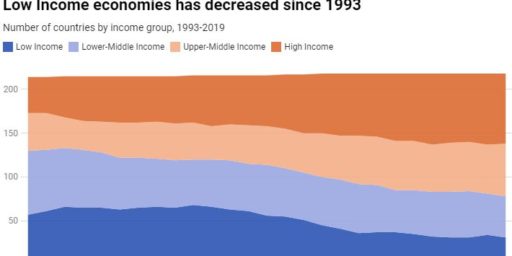Cost of Innumeracy Day
Today is Cost of Government Day, at least for those who can't do math.
Adam Radman passes along a Center for Fiscal Accountability report that can’t possibly be true:
In 2011, Cost of Government Day falls on August 12. Working people must toil 224 days out of the year just to meet all costs imposed by government, a full 27 days longer than 2008.
In other words, in 2011 the cost of government consumes 61.42 percent of national income.
Now, I’m annoyed with taxes as much as the next guy, unless Grover Norquist happens to be sitting next to me. But I’m not completely innumerate, either.
There are 365.25 days in an average year. That works out to 52.17 weeks and a maximum of 260.89 weekdays. For simplicity, call it 52 weeks and 260 weekdays.
Sure, some of us work the occasional weekend. Some work six days a week routinely. But the 5-day workweek is a decent proxy.
Now, let’s say the average American gets 10 vacation days, 5 sick days, and the 10 Federal holidays. (That seems a reasonable aggregate assumption; some get more and some get less vacation and some don’t get every Federal holiday but do get the Friday after Thanksgiving and at least half a day for Christmas Eve and New Years Eve.) That’s 25 days, bringing us down to 235 work days.
So . . . we’re supposed to believe that most people are subsisting on 11 days’ wages?
When I called BS, Radman encouraged me to “actually look at the report.” So, I did.
The Cost of Government Day Components include:
- 103 days just to pay for federal spending
- 44.2 days to pay for state and local expenditures
- 77 days . . . just to cover the cost of government regulations
But that just gets us back to where we started: 224.2 days. And they don’t show their work.
The only plausible charitable explanations (tossing out the possibilities that they’re morons or liars):
- They’re calculating total days, including days off, as “days worked”
- They they’re treating borrowed money as if it were due now
My strong guess is that they’re doing both.
The first is absurdly propagandistic but sellable in the context of “the date of the calendar year on which the average American worker has earned enough gross income to pay off his or her share of the spending and regulatory burden imposed by government at the federal, state and local levels.” After all, people tend to get paid every two weeks.
The second is also defensible in an abstract sense–it is, after all, a “cost”–but not a practical sense. If a family buys a house, we don’t treat it as a one-time expenditure; we amortize it over the length of the mortgage. Doing it this way, then, not only goes against the way people think of spending but also has the double whammy of counting interest payments as a cost while pretending that we haven’t taken out a loan.







There is also the problem of assessing benefits to go along with the costs. How much more would it cost me, for example, if the US Highway I take to work was a toll road? How much more would I have to spend out of pocket if there were no police or fire protection for my home? Further, it is bad enough that I have to send 2 of my kids to private schools–it would cost me even more if I had to send all three (long, complicated story). And while regulations do create costs, there are benefits to knowing my food and drugs are inspected, for example.
The problem is more than innumeracy.
Let’s do the numbers — they say Federal expenditures are 103/365 or 28.2% of GDP. The official calculations are 25.1%. The state and local numbers look several percentage points high, as well.
And then there’s the 21.1% of GDP for the cost of regulations — a number apparently pulled from their tuchas, and about as smelly.
And of course, no one ever gets anything from the government — the government just takes. Yet another reason to ignore Grover Norquist and his groups.
I’m sure Bithead will be along to explain all this to us.
This does not even pass the giggle test. But it’s from Norquist so there is no reason to take it seriously. Unless you are a Tea Stain Republican.
Once again filling my role as the OTB resident engineer and pedant, I must point out that the average year is actually 365.2425 days long.
You’re welcome.
Well, they could present it as “If we weren’t borrowing our kids into debt servitude, you’d have to live on 11 days pay to live on after paying off the government. Anybody believe we’re going to pay off this loan for consumption, not investment before the majority of us die?
As for some things, like public roads, being useful and promotes growth, that is the discussion we have to have. What amount of liberty are we willing to surrender for joint programs. Roads, even public schools failing as they are, are pretty much accepted but keeping up a good portion of the population in a style many of the lower working class cannot fund for themselves, is a real debate we need to have. Welfare to keep people housed and fed, good but at some point you are beyond helping those down on the luck and are paying for other people’s recreation.
Where does this ridiculous Tea Stained Republican meme come from?
I went to public school, attended a State College, and recieved my masters from a State University. I have been successful in two careers, measured by any metric you care to use.
So many of the far right’s positions are based on such utter bullshit, that it’s just hard to take them seriously on anything.
Boyd,
“I must point out that the average year is actually 365.2425 days long.”
True, but since the statistics are for 2011 only, and 2011 has only 365 days, using 365 days is correct.
norm,
I’m not as down on public ed as your average Conservative seems to be, but obviously your experience (and mine, which was also good) is not the entirety of the public school experience. There are a lot of public schools with terrible results. I happen to think that’s mostly due to factors outside the control of the schools, but the results are what they are. We tend to focus on the schools (specifically, the teachers) because that’s something the government can control, or at least do something about. The cultural/economic issues that I think are the root causes of most of the problems in education, on the other hand, are larger and more difficult to do things about. It’s just plain easier to blame teachers, or throw up your hands completely.
This brings to mind the old saying “figures do not lie but liars can figure”. Does anyone think our govt. is not spending more than it is taking in? Is it impossible to balance the budget? Does the debt ever have to be paid? Is it true that, that which can not go on forever , won’t?
@Moosebreath:
Please pay closer attention, MB. James didn’t say there are 365 days in 2011, he said there are 365.25 days in the average year. I addressed what he actually said, and limited it to how many days are in an average year. I didn’t cast any doubt or otherwise comment on the accuracy of his later calculations, I merely corrected James’s figure of 365.25 to 365.2425. I didn’t say it was significant, and even alluded to the immateriality of my comment by calling myself a pedant.
So you’re responding to something I didn’t even say, mean or imply. But thanks for participating! Please pick up your trophy from the table by the exit on your way out.
Rob…
I don’t disagree…especially re: cultural/economic issues.
But I think for conservatives it’s far more simplistic: it’s really just another veiled attack on Unions. However they cannot attack Cops or Firemen, so they attack teachers because they make for an easy target.
I’ve had great teachers at every level. I’ve had mediocre teachers too. However, to make a blanket statement that our public schools are failing is just stupid on the face of it.
Boyd,
And here I thought you were responding to my comment, where I actually used 365 days. Sorry to get in the way of your private, but unlabelled, communication on a public forum.
The meme that public schools are failing is quite prevalent although it is highly inaccurate. The bad part about continuing this meme is that you successfully convince the public to de-fund education, which punishes the good schools as well as the “bad”. I’ll cite Rob in CT for the reasons I put “bad” in quotes (in other words, it’s not usually the school or teachers who are actually bad).
James –
There is another group – I believe much more credible – who does a “tax freedom day” calculation. It resides at about 102 days right now. BTW – that at a high level, comparatively.
@dunce:
Actually, unlike the usual homey analogies to household finances: a) the government can print money, b) the government is immortal. So no, in truth, the debt never does have to be repaid. As long as the debt is serviced, it can go on forever. Sort of like a corporation.
(And yes, the government is not really immortal, but when it ends, the debt is likely to be one of our smaller worries.)
@ Drew…
Isn’t that based on federal taxes only?
Norquist’s site is using state and local as well.
But I still think he’s skewed the data in order to make his ideological argument.
@dunce: Despite what you’ll hear every day from everyone you know, federal deficits are good and necessary for economic growth. In fact the economy couldn’t grow without them.
@Ben Wolf:
Are you sure Ben? Or is it “debt” that is necessary, irrespective of holder.
@john personna: A growing supply of money is necessary for a growing economy. The only way to get that money to the private sector is to spend excess currency into existence.